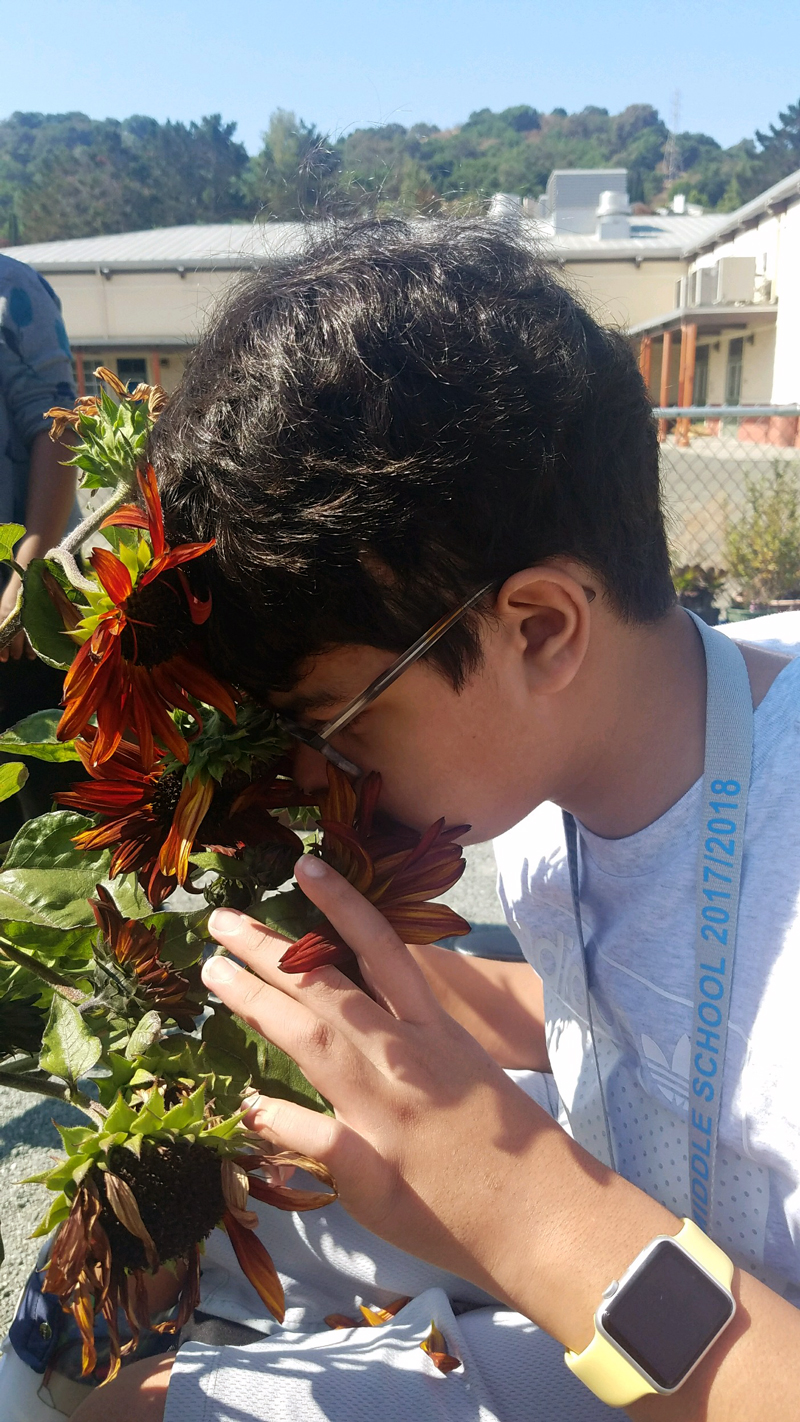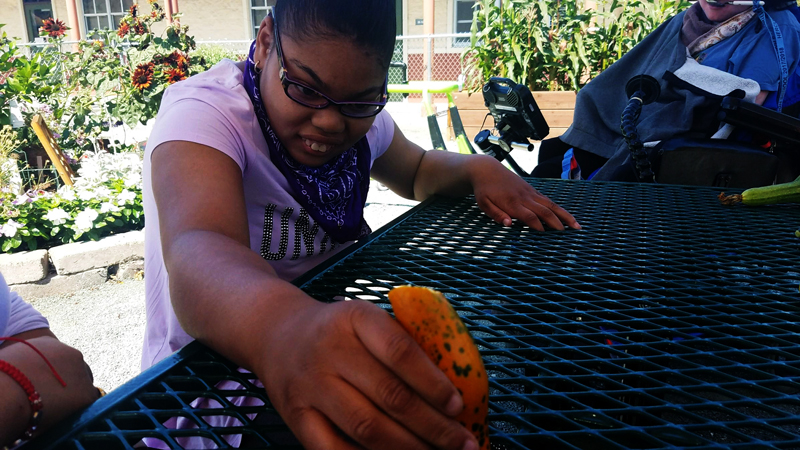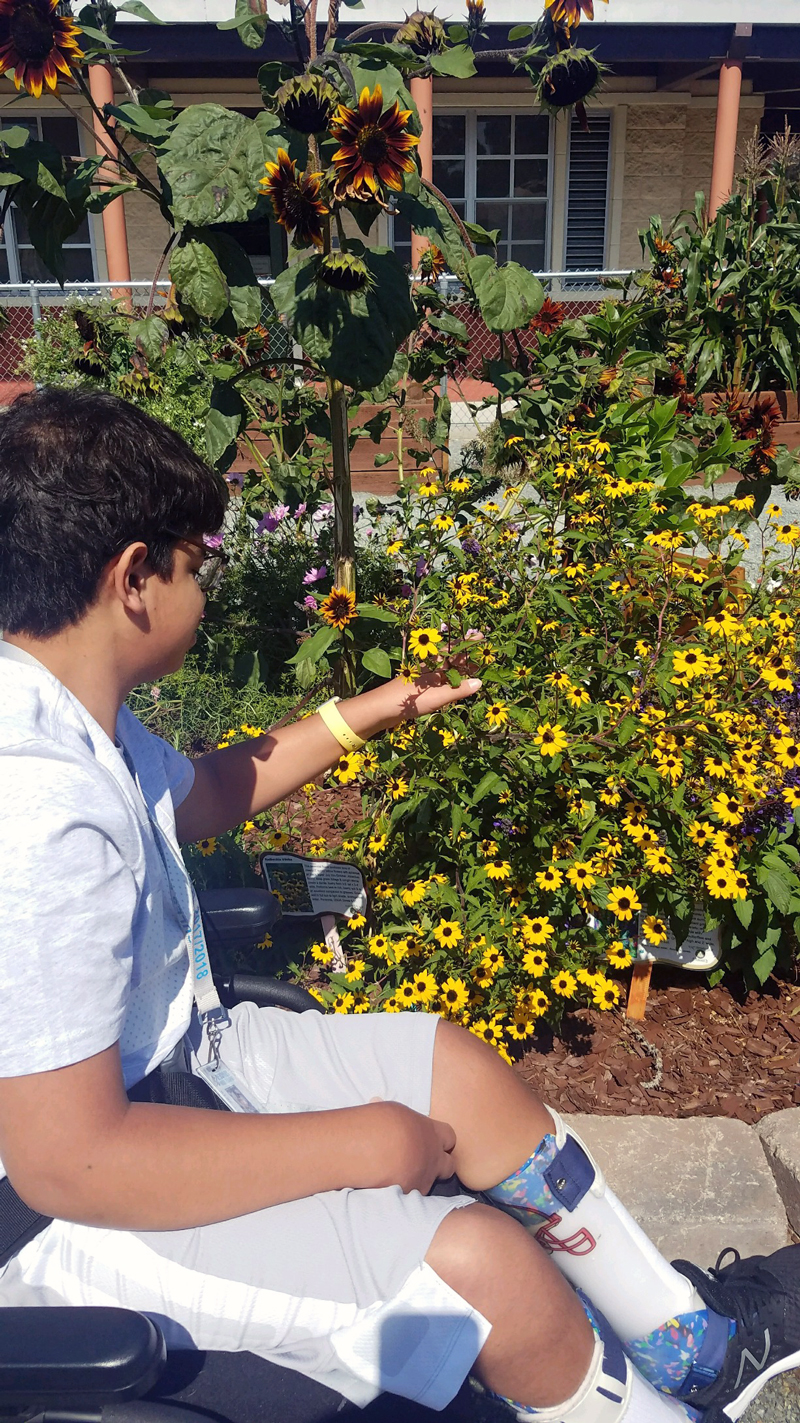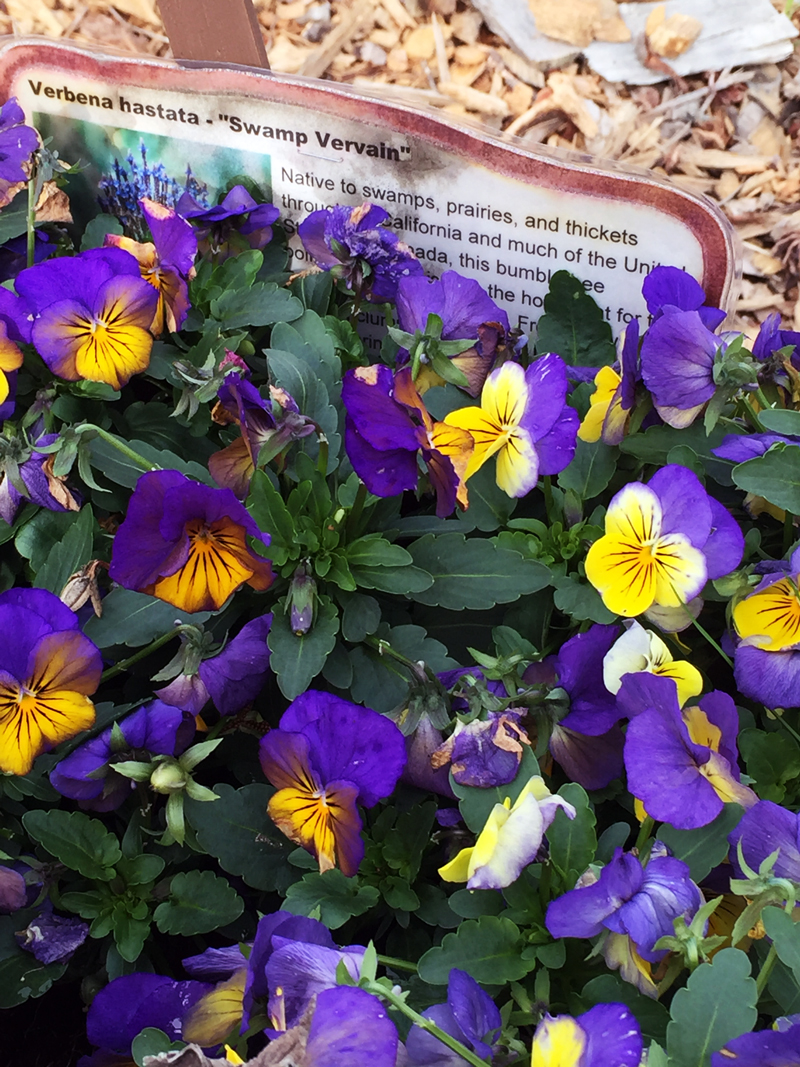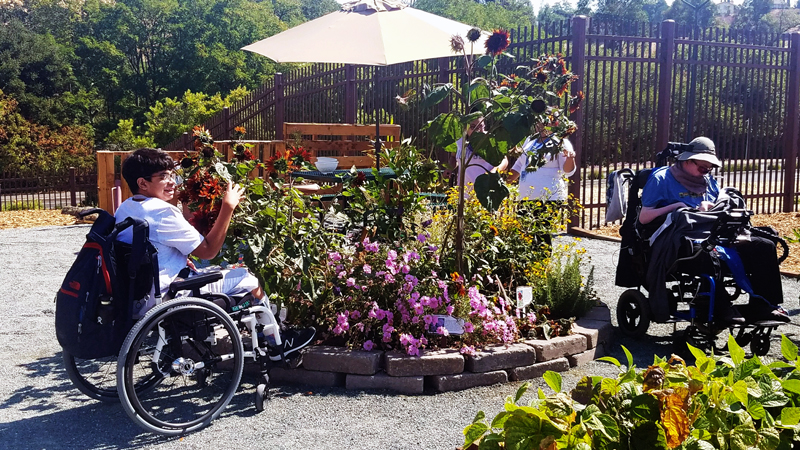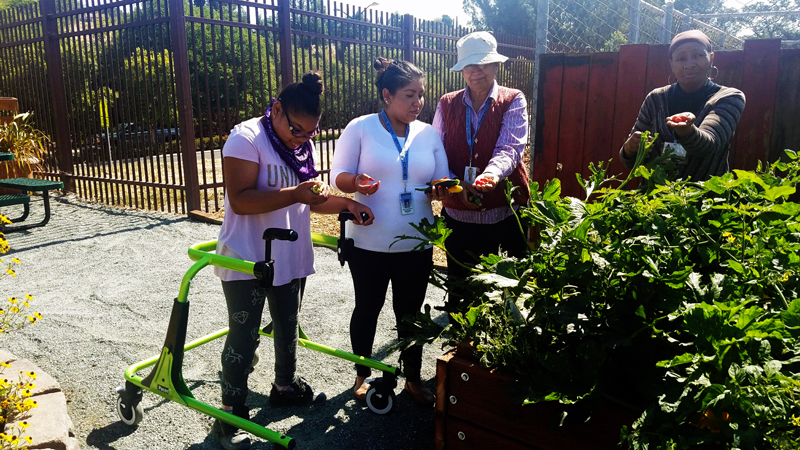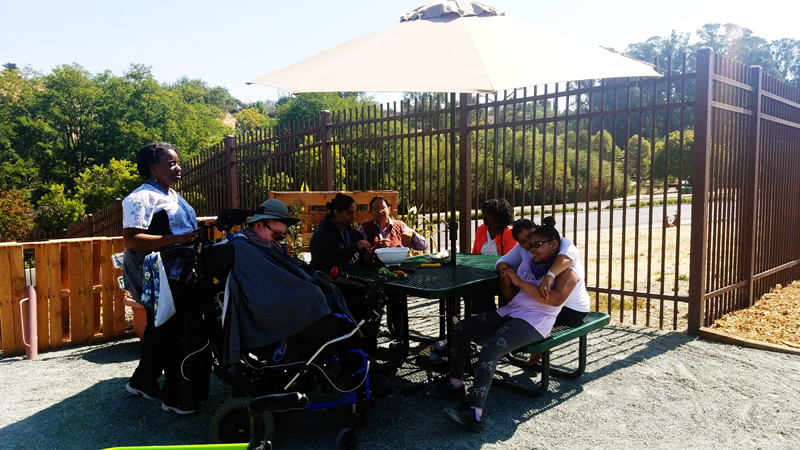With some help, and seed money–literally–from the community, a garden grows in California’s Bay area.
It’s nothing extraordinary, really, just a few beds of daisies and sunflowers, groves of pumpkins and tomatoes, and rows of snow peas, kale, carrots, onions, mint, rosemary, thyme and basil to brighten the landscape, like buckets of Kool-Aid rain, poured from the sky.
The magic, though, is not in the garden but in its gardeners, virtually all of them wheelchair users: the vision-impaired boy with his entire face buried deep inside a cinnamon-color sunflower, taking in the splendor of its smell and texture; a boy with Down’s, giddily raking the soil for the very first time; the girl taking that first bite from a tomato she’d helped grow, and every one of the kids–every single one–absolutely loves shucking corn. Patricia Ogura, a special education teacher at the combined high-school and middle school in the hamlet of Hercules, about 10 miles northeast of Berkeley, California, speculates that its the rhythmic motion of the shucking, the texture of the corn stalks, and the ripping sound, which all combine to stimulate the kids’ senses and imagination.
“Oh, I remember the very happy girl playing in the planter bed, just running her fingers through the soil, and another student smiling and so happy, holding onto a small bouquet of flowers. When I saw that, and other photos captured by their teacher [Mrs. Ogura]…I just started crying ”, said Maddie Yuen, the former president of the Parent-Teacher Organization, whose daughter is a graduate of the high school.
The Hercules Sensory Garden is testament to how the five senses most of us take for granted–to see, to hear, to smell, to taste, and to touch–can help us develop, to grow, as human beings. And just as importantly, it shines a spotlight on all that is possible when even the tiniest community makes up its mind, bands together and creates.
Said Ogura: “I know it’s just a garden but when you look at how much the kids get from it and you look at the effort the entire community put into it, the Sensory Garden is really nothing short of a miracle.”
The story begins with Ogura, who was staring at a parcel of school property that was choked by weeds one day early in 2017 and wondering what she could do to help the middle school and high-school’s “medically-fragile” enrollment –mostly children with Down’s Syndrome or congenital birth defects that impairs vision, hearing, speech, motor skills or some combination of all four.
Everyone who knows her describes Ogura as a “go-getter:” so she went and got it. First she convinced school administrators to buy-in to the idea. They did, but with a caveat: Ogura would have to raise the funds.
Undeterred, Ogura approached the local Boy Scout troop for help with budgeting. They came up with a figure and with numbers firmly in hand, Ogura approached and received grants from the Buck Foundation (through Philanthropic Ventures), Hercules High School Parent Teacher Organization, Hercules Education Foundation, as well as individual donations.
She approached the school’s PTO president at the time, Yuen, who also has a reputation as a go-getter. “Yes, I probably was one of the squeakier parents,” Yuen admits rather sheepishly. “I loved the idea from the start. Every student deserves a good education, regardless of disabilities.”
Before you could say, “how green is my garden?” everyone was pitching in: The Boy Scouts, among many others, provided the muscle; tools, seeds and supplies were donated or discounted. Ogura’s son shuttled borrowed equipment back-and-forth and a team of volunteers cleared the lot, spread weed block fabric, built and filled the raised beds and spread the pathway materials. By the beginning of school last fall, everything had come together in a garden so gorgeous and blooming with life that even the city’s mayor and city councillors had to see.
The irony is that the sensory-garden is a community building exercise that is helping Hercules reinvent itself. Founded in 1881 as a company town for an explosives manufacturer, Hercules has gone from sowing the seeds of destruction, to sowing pumpkin seeds. As urban sprawl and skyrocketing home prices pushes development farther and farther out, Hercules is fast-becoming a viable bedroom community.
Adding to the sense of community-building is Hercules’ remarkable diversity. When united to work in the garden, it could look like a Benetton ad, said Yuen.
Said Ogura: “Thanks to the generosity of community businesses, the Boy Scouts of Troop #76, Dolan Lumber, American Soil, Sugar City Building Materials, Trader Joe’s, Adachi, and Annie’s Annuals (through the support of West County Developing Instructional Gardens in Schools) and many volunteers; and “seed” money from the Buck Foundation (through Philanthropic Ventures), Hercules High School Parent Teacher Organization, Hercules Education Foundation, as well as individual donations, our Sensory Garden has become a wonderful addition to the Hercules Middle/High School environment. We have witnessed the kind of positive changes that can take place when everything and everyone cooperates in the spirit of giving.
Here at the Hercules Educational Foundation, we share Ogura’s appraisal. It was our pleasure to play a role–even a modest one–in the success of the sensory garden, which is a model for the kinds of investments that we envision as building blocks for a stronger and healthier community.
In 2024 Creativity Takes Root in the Garden—And Finally Blooms: An Update
On the very last day of the application window for the Bradley Arts Grant, Patricia Ogura’s classroom paraprofessional suggested she apply.
The special education teacher spoke to the middle school art teacher, Tracie Manipis, to see if she might be interested in doing a project that would impact the entire campus: an art installation in the Sensory Garden, a very special garden with a special story. Manipis agreed and became Ogura’s co-author.
The pair received the grant.
And then began a string of obstacles Ogura and her team would find ways to overcome.
Ogura’s co-author left the school to become principal at another site. The search was on for anyone willing to help her fulfill the grant proposal. All leads were dead ends until two months later, in late February, when Ogura met a Facebook Buy Nothing neighbor. The “porch pickup” plants she was grabbing for the Sensory Garden were being gifted by Rebeca Garcia-Gonzalez. The two got to talking about the plants and the garden, and Garcia-Gonzalez’ work as a …wait for it…a visual artist who installed public murals!
Ogura shared her situation and Garcia-Gonzalez volunteered to sketch out the murals, with the support of the Visual Artists of Richmond. She gave Ogura a list of the supplies they would need for the painting and installation of the murals, and the two set the date, March 9th, in hopes of finishing the project by Hercules Middle School Open House. A remote possibility.
An extensive invitation list received the call for all-hands-on-deck. Everyone from the school board president, to the Rotary Club, the superintendent, site admin, fellow teachers and others were called to action.
And they responded.
High school theater/art teacher, Jamey Genna, offered to prep the plywood (8 panels), have it cut and primed. Home Depot delivered the materials to campus February 28th. But Jamey got sick and Ogura learned the night before the event that the panels weren’t ready.
Coming to the rescue was middle school custodian, Jerry Agustin, moving the plywood and paint to Ogura’s classroom at 5:30 the night before the work was to begin, and arriving ahead of the crew at 7 am the next day to disarm the alarm system.
Darlene Almeida and Margaret Maher drove from Auburn, bringing Maher’s son David and his tools. The now-crew-of-five laid out the plywood and tarps, cut and primed and prepped until the stage was set for the artists to arrive at 9:00 the next morning.
Artists Rebeca and Carmen D. Meléndez spent the next morning sketching the murals.
Meanwhile, students from the high school gave the garden a badly needed cleanup and freshened the beds with a fresh coat of stain. And they planted a beautiful new Satsuma Plum tree.
Lastly, as if to plant a flag, David assembled the wind spinner and sank it into concrete.
Following a lunch and Meyer lemonade made with lemons fresh from the garden, focus shifted to painting the murals. So many people showed up Ogura says she lost count! “It was truly a community effort, and will look fabulous when installed. I am so grateful to everyone.”
The murals were installed by district maintenance after painting was finished by Ms. Genna’s Art/Theater students and the Mural Club, who also donated anti-graffiti coating.
And once again we learn that it takes a village, and that the people of Hercules make the children of their village a priority every single day.
Story by CommunicationsTeam.com

